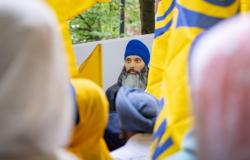Members of the Armed Forces Movement (MFA), nicknamed the “captains’ movement” because junior officers played a major role in it, had good reasons for overthrowing the government. Apart from purely professional requirements, it was mainly a colonial war in which they were dying and which seemed hopeless to them.
There were doubts about her even in the highest military positions. Among the young conspiratorial captains and majors, the book Portugal and the Future found great support, in which the Deputy Chief of the General Staff, António de Spínola, clearly expressed these doubts.
The immediate signal for the revolution was the song Grandola, Vila Morena, which was broadcast by Portuguese radio on the night of April 24-25, 1974. It was composed and written by the singer Zeca Alfonso, called the “troubadour of freedom”, who was banned during the António Salazar regime. His song, which many people listened to that night, set in motion the events that brought about the end of the Portuguese dictatorship. An armed uprising broke out under the leadership of young army officers.
In the streets of Lisbon and other cities, thousands of people took to the streets and mingled with the soldiers there. However, the revolution took place slowly and people took the soldiers as liberators. Red carnations were placed in the lapels of the soldiers’ uniforms and in the barrels of their weapons. During the Carnation Revolution, which was very quick and relatively peaceful, only five people died. In front of the secret police building, which was guarded by loyal pro-regime troops, the soldiers started shooting at the demonstrators.
Tens of thousands of political prisoners
The coup was successful. He ended one of Europe’s oldest and longest-lasting dictatorships, in which basic freedoms were suppressed. The Portuguese dictatorship lasted from 1926 and was based on three pillars: censorship, a single political party and the political police (PIDE). During the dictatorship, 30,000 political prisoners were imprisoned, of which about 50 died.
The head of the then autocratic government, Marcelo Caetano, who replaced Salazar in 1968, and President Américo Tomás had to leave the country after the arrest, were interned in Madeira and eventually found asylum in Brazil. Undemocratic institutions were replaced by democratic ones.
All power in the country passed into the hands of the National Salvation Council (RNS), whose president was General António de Spínola. He was appointed President of the Republic on May 15, 1974. After an unsuccessful attempt at a counter-revolutionary coup in the country on September 28, 1974, Spínola had to resign and was replaced at the head of the country by General Francisco Costa Gomes.
First free elections
The captains’ movement fulfilled its promise, free elections were held within a year of the revolution. Thus, after a period of turmoil, Portugal embarked on the path of classical democracy. After the revolution, a new constitution was written, censorship was abolished, freedom of speech was restored, political prisoners were released, and the Portuguese colonies gained independence.
After 1975, the influence of the Portuguese Communist Party increased, the socialist government nationalized banks and industry, however, the main goal of the so-called Carnation Revolution – the elimination of the dictatorship – remained its irreversible conquest, as well as the independence of Guinea-Bissau, Mozambique, Cape Verde, São Tomé and Angola. Socialist experiments ended only in June 1989, when the Assembly of the Republic approved a new constitution, which abolished all articles related to the nationalization of the main branches of industry and agrarian reform.
Portugal always celebrates the anniversary of the so-called Carnation Revolution in a big way. On the night of April 25, Grandola’s song will be played simultaneously from all television and radio stations, and fireworks will be set off all over the country. A gigantic performance is organized every year in one of Lisbon’s central squares.
The fiftieth anniversary of the so-called Carnation Revolution, which is one of the most fundamental historical events of the 20th century in Portugal, is also being commemorated in Prague this year with an exhibition in the Portuguese Center, which can be visited until May 4. It captures the last years of the Portuguese dictatorship and the first moments after its overthrow between September 1968 and July 1974 through photographs, posters, documents and press clippings.
Zeca Afonso – Grândola, Vila Morena:
Tags: single song ignited Carnation Revolution led Portugal dictatorship
-





